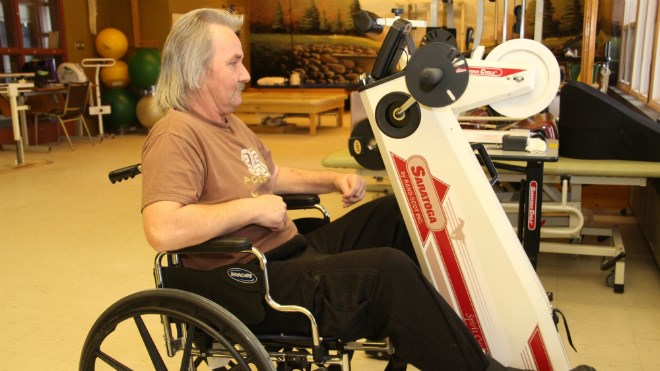After Kim Watchorn had a stroke in October 2012, she underwent a long journey to recover and regain some of the normalcy of her life before.
Thanks to the Independence Centre and Network's (ICAN) post-stroke program, Watchorn plans to return to work soon, handling payroll for an organization in Englehart.
To have access to rehabilitation services – such as physiotherapy and assisted living help – not available in her hometown, Watchorn has stayed at ICAN's Donato Home in Sudbury, for a nominal fee, where she has full access to the organization's post-stroke program.
The home can house up to two patients as they transition between hospital care to returning to their homes and living more independently. While they stay in the home, their meals and laundry are handled by support workers, while they focus on recovery.
But soon, Watchorn and other people from small Northern Ontario communities will be able to benefit from the post-stroke services ICAN offers closer to home.
After around three years of existence, the program has received $1.2 million funding from the North East Local Health Integration Network to expand across northeastern Ontario.
Over the next 18 months, agencies in North Bay, Sault Ste. Marie, Timmins, Parry Sound and Temiskaming will offer services similar to ICAN's to help stroke victims recover.
Hospitals only follow up with patients up to a year after their stroke.
But ICAN works with clients long after the traumatic event.
Around 450 people in Sudbury have a stroke each year. Of that number, around 350 people go into rehab. In its first year, ICAN's post-stroke program helped around half those people. The program has grown every year since.
Rebecca Bowes, the program's regional co-ordinator in Sudbury, said a person's recovery after a stroke never ends. For the rest of their lives it takes continuous effort and help for people to regain mobility and independence.
In addition to rehabilitative services, the post-stroke program also includes a successful support groups for patients and their families.
Marie Leon, ICAN's CEO, said the program holds a special place in her heart because when she was 10 her father had a stroke.
After that day, he was no longer able to speak, and the right side of his body was paralysed. Leon said there were no services available at the time to help him recover after he was discharged from hospital.
Bowes' father has also had two strokes.
“Because of our personal experiences this is so near and dear for us,” said Leon. “This is going to succeed come hell and high water, if it's up to us.”
For Bowes, it is the small victories that can make all the difference in a patient's life. She recounted the story of a post-stroke patient, and resident at ICAN's subsidized apartment building, who was proud to show her a small potato she had peeled.
The woman only had use of one hand, but managed to peel the potato by holding it between her legs, and working ceaselessly until the job was done.
“It's so funny how one little potato can brighten your day,” Bowes concluded.
Join Sudbury.com+
- Messages
- Post a Listing
- Your Listings
- Your Profile
- Your Subscriptions
- Your Likes
- Your Business
- Support Local News
- Payment History
Sudbury.com+ members
Already a +member?
Not a +member?
Sign up for a Sudbury.com+ account for instant access to upcoming contests, local offers, auctions and so much more.
